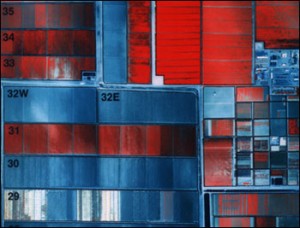Farmers are getting smarter with smart technology that advances water and fertilizer strategy. Dig it:

Red, white, and blue: false color satellite images like this help farmers decide how to care for thirsty fields. (via NASA)
GPS tracking, drones, and other remote sensing devices aren’t just for techies—they’re all increasingly being used on large-scale farms to measure factors like soil moisture and nutrient levels.
The practice, known as precision agriculture, allows farmers to fine-tune watering and application of fertilizers and pesticides based on data they collect.
Harold van Es, a soil scientist and professor at Cornell University, explains: “The primary thing that precision agriculture promises is improved production efficiencies, and also reduced environmental impacts.”
Because it enables better informed water, fertilizer, and pesticide use, precision agriculture can keep farmers’ costs down—and keep our planet healthier, too.
Hear More:
Harold van Es describes some of the “ground-breaking” technology used in precision agriculture.
Get Schooled:
- Harvest the latest on precision agriculture in this article from PrecisionAg
- Dig up the history of precision farming with this article from NASA
- Use this factsheet by the USDA to plow through a list of technologies and their uses in precision ag
The fine print:
This segment was produced in partnership with Cornell’s Atkinson Center for a Sustainable Future




